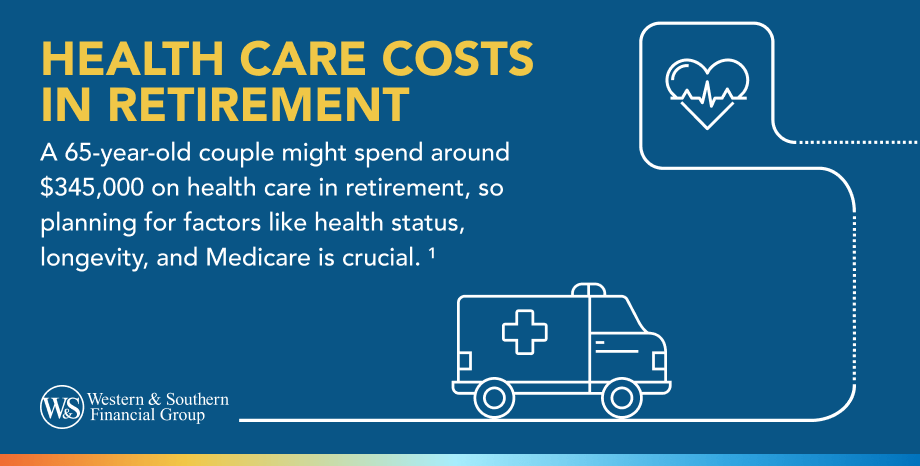

Key Takeaways
- Health care is one of the largest expenses in retirement, with a 65-year-old couple expected to spend about $345,000 on medical costs.
- Your overall health and life expectancy can greatly affect how much you’ll spend on health care over time.
- Medicare helps cover many costs after age 65, but you may still need to budget for premiums, deductibles, and supplemental insurance.
- Building savings through HSAs, retirement accounts, and long-term care insurance can help manage future health expenses.
- Living a healthy lifestyle may help lower medical costs and improve quality of life throughout retirement.
After housing and transportation, health care is one of the largest expenses to consider in the retirement planning process. While it's difficult to know exactly how much you will need to save for health care costs in retirement, there are some considerations to keep in mind such as how much you might need to pay for insurance premiums. There are also some ways to plan ahead to help reduce medical costs in retirement. Here's some information to consider.
How Much Does Health Care Cost in Retirement?
According to Fidelity, a report found that a 65-year-old couple could expect to spend an average of $345,000 in total health care and medical expenses during retirement.1 While it's impossible to predict the future and how much you will have to pay for health care during your golden years, there are a few factors to consider.
Health Status & Life Expectancy
Health care costs are generally lower for healthy Americans than they are for those in poor health. However, with a longer life expectancy, these costs tend to be higher later in life. For example, a healthy 65-year-old who reaches their 90s may spend significantly more than someone who passes in their 70s, largely because of additional years of premiums and growing out-of-pocket costs.2
Medicare & Insurance Coverage
If you retire before age 65, you'll need to cover your own insurance costs. At age 65, you qualify for Medicare coverage. Most people don't pay a premium for Medicare Part A. Keep in mind that co-insurance and deductibles may apply. Depending on your health and other factors, you may also need Medicare supplement insurance.
How Much Do Health Care Premiums Cost in Retirement?
Health care premiums can make up a large portion of your total and ongoing health-related costs in retirement. When planning for retirement, it's a good idea to estimate how much you'll need to spend on premiums, which may include the various parts of Medicare, supplemental insurance, potential co-insurance and deductible costs.3
Here are the current Medicare premiums and related costs for 2025:
| Medicare Part | Description | 2025 Cost Information |
|---|---|---|
| Part A | Hospital insurance covering inpatient hospital stays, skilled nursing facility care, hospice, and some home health care. | Standard monthly premium:$518. |
| Part B | Medical insurance covering doctor visits, outpatient care, medical supplies, and preventive services. | Standard monthly premium: $185. Annual deductible: $257. After deductible, you generally pay 20% of Medicare-approved costs. |
| Part C (Medicare Advantage) | Offered by private insurers approved by Medicare. Combines Parts A and B, often with added benefits like vision, dental, and prescription coverage. | Standard monthly premium: Costs vary by plan. Must have Part A and Part B to enroll. |
| Part D | Prescription drug coverage offered by private insurers approved by Medicare. | Standard monthly premium: Costs vary by plan. |
5 Ways to Help You Prepare for Your Health Care Costs in Retirement
Many of the medical costs in retirement are beyond your control. But you can do some things to help make them more affordable. There are at least five ways you can start to prepare for medical costs in retirement: open a health savings account (HSA), add to your retirement savings, use Medicare supplement insurance if needed, consider long-term care insurance and maintain a healthy lifestyle.
1. Open a Health Savings Account (HSA)
A health savings account (HSA) allows you to save money toward certain qualified health care costs on a pre-tax basis. The IRS sets HSA contribution limits and minimum deductibles for high-deductible health plans (HDHPs) each year. For 2025, you can contribute up to $4,300 for yourself or up to $8,550 for family coverage.4 Keep in mind that you may only contribute to an HSA if you have an HDHP. The minimum deductible for an HDHP is $1,650 for an individual and $3,300 for a family.
2. Add to Your Retirement Savings
Since retirement accounts, such as IRAs and 401(k) plans, will likely be major sources of income during retirement, you can help boost this income by maximizing your contributions to these accounts whenever possible. The maximum contribution to a 401(k), 403(b), most 457 plans and the federal government’s Thrift Savings Plan is $24,500 ($32,500 if you're 50 or older).5
Maximum Contribution for an IRA
3. Consider Medicare Supplement Insurance
Medicare supplement insurance is often referred to as a Medigap policy because it helps to fill in the gaps of health costs where Medicare Parts A and B may not be sufficient. This supplemental insurance is offered by private insurers and can cover health care costs, such as Medicare co-payments, co-insurance and deductibles.
4. Consider Long-Term Care Insurance
Long-term care (LTC) insurance can help to reduce health care costs in retirement by helping to cover the cost of a long-term care facility in the event that you need one. If you develop a chronic and disabling condition that requires supervision, LTC insurance can cover nursing home care, home health care or adult day care. Long-term care can be expensive, and an LTC insurance policy can help to reduce your health care costs in retirement if you end up needing this care.
5. Maintain a Healthy Lifestyle
By maintaining a healthy lifestyle, you decrease the odds of needing costly health care. Some of the things you can do that may help you stay healthy in retirement include:
- Exercising regularly: Getting your blood pumping and improving strength and balance may help to reduce stress and reduce odds of heart disease.
- Maintaining a healthy diet: Eating right is smart at any age, but a good diet in retirement may be more beneficial for reducing your risk of potential ailments, such as diabetes and heart disease.
- Socializing: Being around other people can help to keep your mind sharp and help reduce stress from being alone.6
- Limiting alcohol intake: Alcohol in moderation may not be a health risk, but it's a good idea to avoid consuming alcohol excessively.
- Eliminating tobacco use: By refraining from using tobacco, you may help keep your lungs healthy as you get older.
Understanding the Bottom Line
Health-related costs are likely one of the biggest expenses you'll have in retirement. While many medical costs and other health care expenses may be unavoidable, planning in advance can help you better manage these costs during retirement. Being aware of health care costs - such as Medicare premiums, co-insurance and deductibles - can help you gain a better idea of how much money you'll need to save for retirement.
Even if you are in retirement now, it's not too late to take advantage of certain strategies to help mitigate your medical costs. If you still need additional information or help, you can speak with a financial professional who is knowledgeable about retirement planning products and services.
Plan ahead to manage health expenses and help protect your retirement savings. Start Your Free Plan
Sources
- Fidelity Investments® Releases 2025 Retiree Health Care Cost Estimate, a Timely Reminder for All Generations to Begin Planning. https://newsroom.fidelity.com/pressreleases/fidelity-investments--releases-2025-retiree-health-care-cost-estimate--a-timely-reminder-for-all-gen/s/3c62e988-12e2-4dc8-afb4-f44b06c6d52e.
- Retirement Healthcare Costs: What to Expect and How to Prepare. https://landsbergbennett.com/blogs/insights/retirement-healthcare-costs-what-to-expect-and-how-to-prepare.
- Costs. https://www.medicare.gov/basics/costs/medicare-costs.
- Part III - Administrative, Procedural, and Miscellaneous. https://www.irs.gov/pub/irs-drop/rp-24-25.pdf.
- 401(k) limit increases to $24,500 for 2026, IRA limit increases to $7,500. https://www.irs.gov/newsroom/401k-limit-increases-to-24500-for-2026-ira-limit-increases-to-7500.
- Social Connections & Mental Health: Why We Need Each Other. https://thewellcounselinggroup.com/social-connections-mental-health-why-we-need-each-other.





























